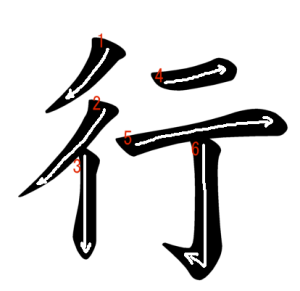0603-Jouyou-kanji “行” Stroke Order and Meanings

Jouyou Kanji “行”

Jouyou Kanji “行” Stroke Order
| Stroke # |
6 Strokes |
| On-Yomi |
こう(kou) |
| ぎょう(gyou) |
| あん(an) |
| Kun-Yomi |
い(く)(i(ku)) |
| ゆ(く)(yu(ku)) |
| おこな(う)(okona(u)) |
| みち(michi) |
| や(る)(ya(ru)) |
| Meanings |
Go, Visit, Walk, Go around |
| Do, Perform, Act, Action, Deed |
| Way, Road, Street, Route, Course |
| Journey, Travel, Trip |
| While walking, While going, While moving |
| Pass, Leave, Depart |
| Semi-cursive writing |
| Line, Row, Verse |
| Austerities, Penance |
| Store, Shop, Bank |
| Order of brothers and sisters |
Kanji words which contain Kanji “行”, and their meanings
| Words |
Meanings |
| 行火(あんか-a n ka) |
Bed warmer, Foot warmer |
| 行脚(あんぎゃ-a n gya) |
Travel on foot, Walking tour |
| 行宮(あんぐう-a n gu u) |
Temporary palace for an Emperor |
| 行灯(あんどん-a n do n) |
Andon, Japanese-style lamp, Paper-enclosed lantern |
| 行間(ぎょうかん-gyo u ka n) |
Line spacing, Space between the lines |
| 行儀(ぎょうぎ-gyo u gi) |
Manners, Behavior |
| 行啓(ぎょうけい-gyo u ke i) |
Attendance (of the Empress) |
| 行幸(ぎょうこう-gyo u ko u) |
Imperial visit, Going out together of Emperor and Empress |
| 行司(ぎょうじ-gyo u ji) |
Sumo referee |
| 行事(ぎょうじ-gyo u ji) |
Event |
| 行者(ぎょうじゃ-gyo u ja) |
Religious practitioner |
| 行住坐臥(ぎょうじゅうざが-gyo u ju u za ga) |
All the activities in ordinary life, Always |
| 行書体(ぎょうしょたい-gyo u sho ta i) |
Semi-cursive script |
| 行商(ぎょうしょう-gyo u sho u) |
Peddling, Peddler |




Comments